 Petzlover
Petzlover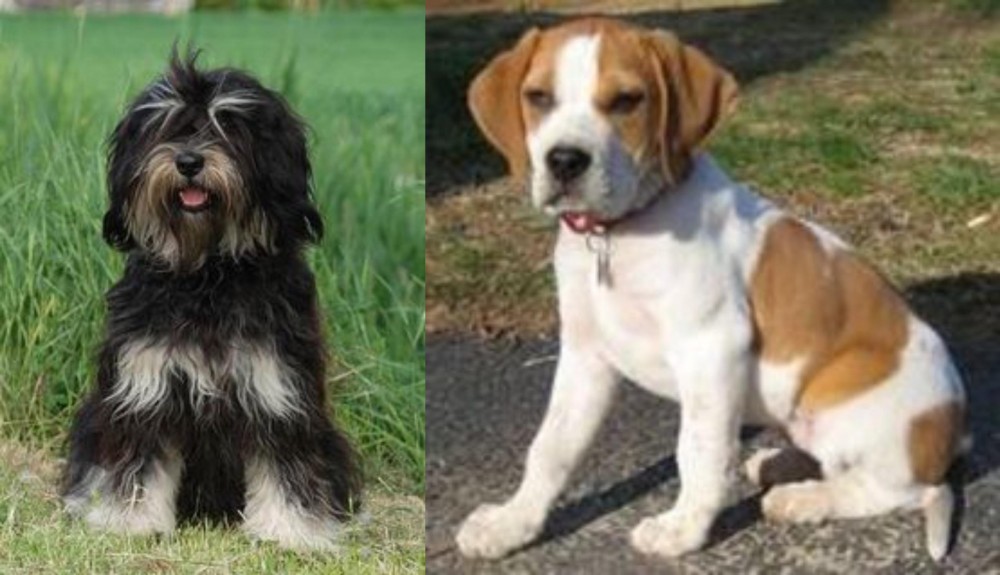 Cao da Serra de Aires is originated from Portugal but Francais Blanc et Orange is originated from France. Cao da Serra de Aires may grow 15 cm / 5 inches shorter than Francais Blanc et Orange. Cao da Serra de Aires may weigh 9 kg / 19 pounds lesser than Francais Blanc et Orange. Cao da Serra de Aires may live 6 years more than Francais Blanc et Orange. Both Cao da Serra de Aires and Francais Blanc et Orange has almost same litter size. Cao da Serra de Aires requires Moderate Maintenance. But Francais Blanc et Orange requires Low Maintenance
Cao da Serra de Aires is originated from Portugal but Francais Blanc et Orange is originated from France. Cao da Serra de Aires may grow 15 cm / 5 inches shorter than Francais Blanc et Orange. Cao da Serra de Aires may weigh 9 kg / 19 pounds lesser than Francais Blanc et Orange. Cao da Serra de Aires may live 6 years more than Francais Blanc et Orange. Both Cao da Serra de Aires and Francais Blanc et Orange has almost same litter size. Cao da Serra de Aires requires Moderate Maintenance. But Francais Blanc et Orange requires Low Maintenance
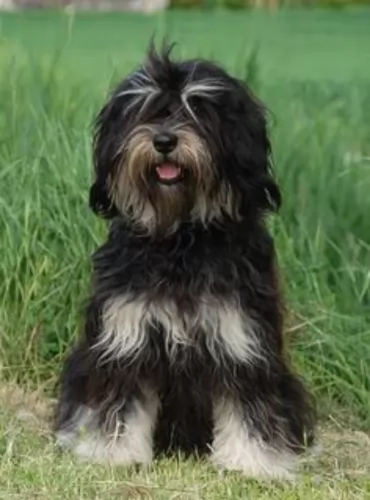 Ancestors of the Cao da Sera de Aires were used for herding livestock in the Serra de Aires and Alentejo, Portugal. This herding dog is native to Portugal and throughout the 20th Century he was kept as a working dog.
Ancestors of the Cao da Sera de Aires were used for herding livestock in the Serra de Aires and Alentejo, Portugal. This herding dog is native to Portugal and throughout the 20th Century he was kept as a working dog.
Known also as the Portuguese Sheepdog, Portuguese Shepherd Dog or Serra de Aires Mountain Dog, there are some questions surrounding the breed's ancestry as there are few records of dogs before 1900. The dog is thought to be related to the Pyrenean and Catalan Sheepdogs and that it has descended from Briards which were imported into Portugal and crossed with the Pyrenean Sheepdog.
The Cão da Serra de Aires breed standard was accepted by the Portuguese Kennel Club, and the breed was recognized internationally in 1996. The dog was also recognized by the United Kennel Club in the Herding Group in 2006.
 The Chien Francais Blanc et Orange is one of the three versions of the Chien Francais. There is the Francais Blanc et Noir and the Francais Tricolor. These scent hounds were distinguished by their colors. The Francais Blanc et Orange like the other two, was a descendent of a variety of English and French hunting hounds, including the Hound of Saintonge.
The Chien Francais Blanc et Orange is one of the three versions of the Chien Francais. There is the Francais Blanc et Noir and the Francais Tricolor. These scent hounds were distinguished by their colors. The Francais Blanc et Orange like the other two, was a descendent of a variety of English and French hunting hounds, including the Hound of Saintonge.
The Hound od Saintonge is extinct but has several breeds coming from his line including the Billy – a pointer. Similar to the Francais Blanc et Orange, the Billy hunted in packs. Coming from these roots the Francais Blanc et Orange was developed around the 1900’s. Many considers the Chien Francais trio to be the Newest and Rarest French Hounds. The Francais Blanc et Orange is a white and orange hound, considered to be the rarest of the three. They were developed by crossing English Foxhounds with French Scent Hounds.
The Francais Blanc et Orange is a born hunter and a good one at that. In his pack he is happy and superbly equipped for the hunt. His vision and scenting skills are unsurpassed. They can cover a large expanse of territory in a very short period of time. They were known for hunting large boar and deer as well as small prey like foxes or rabbits. They were recognized as a separate breed by the UKC in 2006 but are not recognized by the AKC.
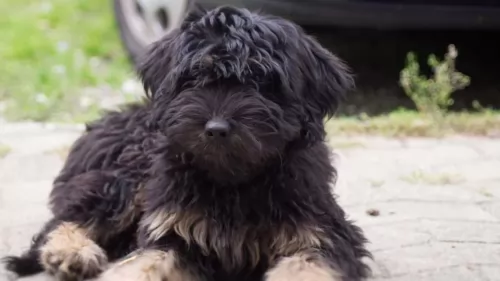 The beautiful Cão da Serra de Aires is a medium-sized dog. He stands at 45 to 55 cm at the withers and weighs about 17 to 27 kg. He is recognizable by the long, shaggy, single-layer coat, of straight or slightly wavy hair. Don’t be deceived by the coat as below, the dog has a muscular, athletic body.
The beautiful Cão da Serra de Aires is a medium-sized dog. He stands at 45 to 55 cm at the withers and weighs about 17 to 27 kg. He is recognizable by the long, shaggy, single-layer coat, of straight or slightly wavy hair. Don’t be deceived by the coat as below, the dog has a muscular, athletic body.
The coat comes in different shades such as fawn, gray, yellow and black. The dog has a long tail which is held straight out or down and he has medium-length, floppy ears. You’ve got to look hard, as the facial features of the dog are hidden by its shaggy coat. He has a lot of facial hair that sometimes you have to wonder if he can see out of his eyes.
The Cao da Serra de Aires is a wonderful canine companion and is devoted and loyal, forming strong bonds with their human family. He is a playful, amicable dog and gets on well with children in the home as well as with other pets.
He is intelligent and trainable, and when properly trained and socialized,he becomes an even nicer pet to have around and is obedient to his master’s voice. He is territorial, strong willed and dominant and makes a good watchdog too.
 The Francais Blanc et Orange is a large , muscular and lean hunting dog, a typical pack hound out of France. They have a flat to somewhat domed head, long legs, and dropped, long ears and a square muzzle. The nose is either orange-brown or black and has large nostrils. Their eyes are deep set, dark and widely spaced. They have a deep chest which leads to their propensity toward the situation of bloat. This breed is smaller than the Chien Francais Blanc et Noir that hunts in packs. The skin is the fur’s color. They are athletic and display tremendous perseverance.
The Francais Blanc et Orange is a large , muscular and lean hunting dog, a typical pack hound out of France. They have a flat to somewhat domed head, long legs, and dropped, long ears and a square muzzle. The nose is either orange-brown or black and has large nostrils. Their eyes are deep set, dark and widely spaced. They have a deep chest which leads to their propensity toward the situation of bloat. This breed is smaller than the Chien Francais Blanc et Noir that hunts in packs. The skin is the fur’s color. They are athletic and display tremendous perseverance.
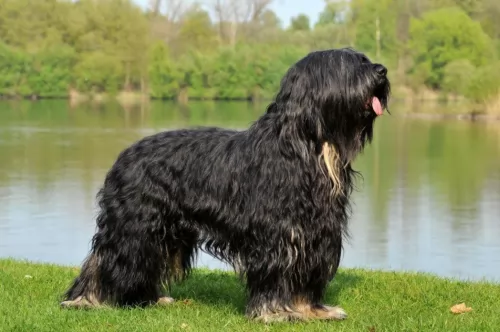 The Cão da Serra de Aires is such a loyal dog to his human family that he makes a splendid pet. He is active, having worked historically at herding and guarding.
The Cão da Serra de Aires is such a loyal dog to his human family that he makes a splendid pet. He is active, having worked historically at herding and guarding.
Socialization and obedience training ensure that he becomes an exceptional pet and he has a host of positive attributes to his name – he is intelligent, energetic, loyal and loving. He may have been used long ago to guard livestock, but today he is selected as a pet specifically for his excellent companionship and for his protective nature.
 They are not exactly child oriented dogs as they are so oriented toward the hunt and the pack. With serious exercise and mental stimulation, they can become a good family dog, but it is not in their instincts.
They are not exactly child oriented dogs as they are so oriented toward the hunt and the pack. With serious exercise and mental stimulation, they can become a good family dog, but it is not in their instincts.
hunting in packs/scent and vision
He is not suited for apartment life and does need a large, fenced yard to run and play. Being a scent hound, he will constantly be sniffing for a trail to follow so put him to work.
The breed is highly intelligent and easily trainable.
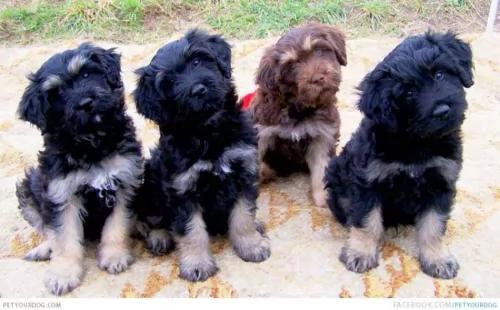 As with most dogs that are looked after well, their health can be good. The Cao da Serra de Aires isn’t likely to keep you at the vet often. Just like with any good dog, there are some health disorders that can benefit you to know about.
As with most dogs that are looked after well, their health can be good. The Cao da Serra de Aires isn’t likely to keep you at the vet often. Just like with any good dog, there are some health disorders that can benefit you to know about.
Being forewarned , you can get your pet to the vet quickly before the illness gets out of hand.
There are some pet owners who want to have their pets tested by the Orthopedic Foundation for Animals as well as the Canine Eye Registration Foundation to rule out health defects such as hip dysplasia and cataracts before they manifest themselves in their pets. This is of particular importance to breeders so as to prevent the parent dogs passing bad genetic conditions to the puppies.
This is a common skeletal disease where the dog’s hip joints don’t develop properly. It can be terribly painful for your pet to get around. It’s a genetic condition and while it is more prevalent in big dogs, any breeds are susceptible.
Your dog will battle along with painful joints and sometimes his hind-end will be lame. You’ll notice that once lying down, he battles to get up again. Fortunately vets are well acquainted with this ailment and they have different options to treat and manage it.
Cataracts in your dog come about from a disease process which affects the lens of the eye. The eye loses its transparency and impairs vision. There are some instances where cataracts can cause blindness. You’ll see a whitish gray area in your pets eye. The most common cause of cataracts is genetics. Get your pet to the vet who will do certain tests to evaluate the eyes and make a recommendation.
 As with any dog with log floppy ears, infection is always a concern. Make sure you clean them after every hunting trip, romp or play session.
As with any dog with log floppy ears, infection is always a concern. Make sure you clean them after every hunting trip, romp or play session.
Like many large dogs the Blanc et Orange has a propensity to acquire hip dysplasia. It is known that joint dysplasia has a genetic component and should be screened for. Can cause lameness and arthritis.
This is a real danger for the Blanc et Orange. They are deed chested and these are the dogs that are most likely to get bloat. The stomach is twisted and distended. It can be fatal if not treated quickly.
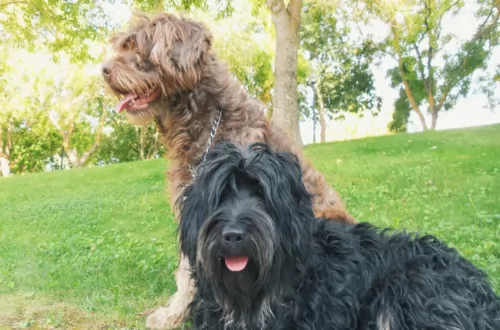 As a working dog used to long hours of action, the Cao da Serra de Aires will need lots of activity. He’ll need you taking him for long walks and playing ball games with him. He can become frustrated and destructive when left without any physical stimulation.
As a working dog used to long hours of action, the Cao da Serra de Aires will need lots of activity. He’ll need you taking him for long walks and playing ball games with him. He can become frustrated and destructive when left without any physical stimulation.
The Cao da Serra de Aires may have long hair but he isn’t high maintenance. He won’t require professional grooming, but will require a good brush a least twice a week. This is because the long coat can tangle.
To keep him looking his best, you’ll want to be trimming the hair around his paws. Another important grooming task is checking his ears and cleaning them. You have to be careful about cleaning your pet ears if you don’t know how, as it could damage the ears. Your vet can always advise you on how this is done.
 Until about 18 months of age feed between 1 and 1.5 cups of high quality puppy, dry food, made for sporting dogs. Divide this into 3 meals per day.
Until about 18 months of age feed between 1 and 1.5 cups of high quality puppy, dry food, made for sporting dogs. Divide this into 3 meals per day.
3 cups day – After 18 month feed 3 cups per day of a high quality, adult dry food made for sporting dogs. Divide this into 2 meals per day.
Outstanding scent and vision
Even though they are warm and welcoming to people, these are very serous dogs. They usually live outside in packs as they are an incredible pack animal. All they want in life is to hunt. However, if they cant hunt they need at least a couple hours per day od vigorous exercise. They are obviously better off in a rural environment than a city one. Put him in field trails, scent trials, barn hunt and playing fetch.